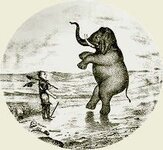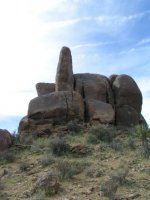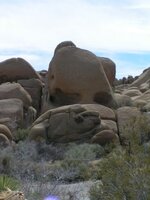pegleglooker
Bronze Member
- Jun 9, 2006
- 1,857
- 238
- Detector(s) used
- ace 250
- Primary Interest:
- All Treasure Hunting
I have seen the " Elephant "
What does it mean... and why. California miner's who left from points east were known to have said that they were " going to see the elelphant ". Here is what it means:
The Elephant

I think that I may without vanity affirm that I have "seen the elephant"
Louisa Clapp
To forty-niners and those following, no expression characterized the California gold rush more than the words "seeing the elephant." Those planning to travel west announced they were "going to see the elephant." Those turning back claimed they had seen the "elephant's tracks" or the "elephant's tail," and confessed they'd seen more than enough of the animal.
The expression predated the gold rush, arising from a tale current when circus parades first featured elephants. A farmer, so the story went, hearing that a circus was in town, loaded his wagon with vegetables for the market there. He had never seen an elephant and very much wished to. On the way to town he encountered the circus parade, led by an elephant. The farmer was thrilled. His horses, however, were terrified. Bolting, they overturned the wagon and ruined the vegetables. "I don't give a hang," the farmer said, "for I have seen the elephant."
For gold rushers, the elephant symbolized both the high cost of their endeavor -- the myriad possibilities for misfortune on the journey or in California -- and, like the farmer's circus elephant, an exotic sight, and unequaled experience, the adventure of a lifetime.
Thank for reading
PLL
What does it mean... and why. California miner's who left from points east were known to have said that they were " going to see the elelphant ". Here is what it means:
The Elephant

I think that I may without vanity affirm that I have "seen the elephant"
Louisa Clapp
To forty-niners and those following, no expression characterized the California gold rush more than the words "seeing the elephant." Those planning to travel west announced they were "going to see the elephant." Those turning back claimed they had seen the "elephant's tracks" or the "elephant's tail," and confessed they'd seen more than enough of the animal.
The expression predated the gold rush, arising from a tale current when circus parades first featured elephants. A farmer, so the story went, hearing that a circus was in town, loaded his wagon with vegetables for the market there. He had never seen an elephant and very much wished to. On the way to town he encountered the circus parade, led by an elephant. The farmer was thrilled. His horses, however, were terrified. Bolting, they overturned the wagon and ruined the vegetables. "I don't give a hang," the farmer said, "for I have seen the elephant."
For gold rushers, the elephant symbolized both the high cost of their endeavor -- the myriad possibilities for misfortune on the journey or in California -- and, like the farmer's circus elephant, an exotic sight, and unequaled experience, the adventure of a lifetime.
Thank for reading
PLL

















